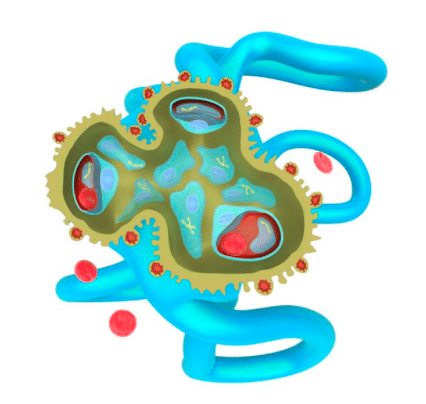What Is Glomerulonephritis?
This intimidating word refers to a specific type of kidney disorder.
Kidneys are amazing organs that perform complex functions. Filtering waste products and extra fluid out of the blood is one example. This ability to filter comes from clusters of microscopic blood vessels with tiny pores.
When this condition strikes, these tiny vessels (glomeruli) become inflamed and cause problems.
What Causes It?
Glomerulonephritis may show up quickly (acute) or develop slowly over time (chronic). It may strike on its own or manifest as part of any number of other disorders, such as:
- Bacterial, viral, or parasitic infection (often skin or throat)
- Lupus
- Diabetes
- An autoimmune disorder
- An inherited genetic disorder
What Symptoms Might Appear?
Acute Glomerulonephritis
Some people do not develop any symptoms. Others may deal with:
- Tissue swelling (edema) caused by fluid retention – often face, legs, eyelids
- Low urine volume
- Darker urine containing blood and protein
- Higher blood pressure
Chronic Glomerulonephritis
This slower-to-develop form of the condition tends to generate symptoms (some mild) that may go undetected for years:
- Tissue swelling, often ankles and face
- Higher blood pressure
- Frequent urination at night
- Foamy or bubbly urine (excess protein)
- Abdominal pain
- nosebleeds
It often leads to damaging kidney failure, which may lead to lack of appetite, vomiting, nausea, itchy skin, and tiredness.
How Is It Treated?
In some cases, medications that suppress the immune system may be advised. Most treatment regimens will depend on the specific form of the disorder.
Acute
For a fortunate few, the acute form will disappear on its own. For others, a physician may provide varying forms of treatment:
- Medication
- Temporary treatment with artificial kidney machine (to remove excess fluid)
- Blood filtering (plasmapheresis) to remove harmful proteins from blood
Chronic
Your physician may advise you to:
- Maintain reasonable blood pressure
- Take diuretic medication to treat swelling
- Use ACE inhibitor medication to help slow the progression of this condition
- Use calcium supplements
- Reduce potassium, salt, and protein
What is Nephrotic Syndrome?
When glomerulonephritis strikes, inflammation of the tiny filtering blood vessels can lead to red blood cells and protein escaping into the urine.
If nephrotic syndrome develops, this means the vessels are leaking massive amounts of protein into the urine – it may become frothy, foamy, and dark yellow. Blood levels of cholesterol and triglycerides may rise while the albumin level drops.
Diuretic medications may be ordered to help with swelling, and corticosteroids or immune suppressors may be provided to reduce lost protein.
Physicians trained in kidney disorders like the kidney specialists at Richmond Nephrology Associates are well-equipped to help patients manage these challenging conditions.





